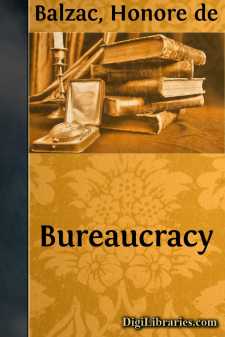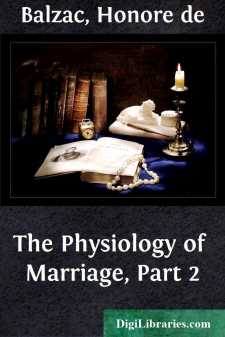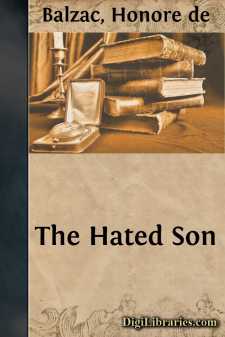Categories
- Antiques & Collectibles 13
- Architecture 36
- Art 48
- Bibles 22
- Biography & Autobiography 813
- Body, Mind & Spirit 142
- Business & Economics 28
- Children's Books 17
- Children's Fiction 14
- Computers 4
- Cooking 94
- Crafts & Hobbies 4
- Drama 346
- Education 46
- Family & Relationships 57
- Fiction 11829
- Games 19
- Gardening 17
- Health & Fitness 34
- History 1377
- House & Home 1
- Humor 147
- Juvenile Fiction 1873
- Juvenile Nonfiction 202
- Language Arts & Disciplines 88
- Law 16
- Literary Collections 686
- Literary Criticism 179
- Mathematics 13
- Medical 41
- Music 40
- Nature 179
- Non-Classifiable 1768
- Performing Arts 7
- Periodicals 1453
- Philosophy 64
- Photography 2
- Poetry 896
- Political Science 203
- Psychology 42
- Reference 154
- Religion 513
- Science 126
- Self-Help 84
- Social Science 81
- Sports & Recreation 34
- Study Aids 3
- Technology & Engineering 59
- Transportation 23
- Travel 463
- True Crime 29
Bureaucracy
by: Honore de Balzac
Categories:
Description:
Excerpt
CHAPTER I. THE RABOURDIN HOUSEHOLD
In Paris, where men of thought and study bear a certain likeness to one another, living as they do in a common centre, you must have met with several resembling Monsieur Rabourdin, whose acquaintance we are about to make at a moment when he is head of a bureau in one of our most important ministries. At this period he was forty years old, with gray hair of so pleasing a shade that women might at a pinch fall in love with it for it softened a somewhat melancholy countenance, blue eyes full of fire, a skin that was still fair, though rather ruddy and touched here and there with strong red marks; a forehead and nose a la Louis XV., a serious mouth, a tall figure, thin, or perhaps wasted, like that of a man just recovering from illness, and finally, a bearing that was midway between the indolence of a mere idler and the thoughtfulness of a busy man. If this portrait serves to depict his character, a sketch of this man's dress will bring it still further into relief. Rabourdin wore habitually a blue surcoat, a white cravat, a waistcoat crossed a la Robespierre, black trousers without straps, gray silk stockings and low shoes. Well-shaved, and with his stomach warmed by a cup of coffee, he left home at eight in the morning with the regularity of clock-work, always passing along the same streets on his way to the ministry: so neat was he, so formal, so starched that he might have been taken for an Englishman on the road to his embassy.
From these general signs you will readily discern a family man, harassed by vexations in his own household, worried by annoyances at the ministry, yet philosopher enough to take life as he found it; an honest man, loving his country and serving it, not concealing from himself the obstacles in the way of those who seek to do right; prudent, because he knew men; exquisitely courteous with women, of whom he asked nothing,—a man full of acquirements, affable with his inferiors, holding his equals at great distance, and dignified towards his superiors. At the epoch of which we write, you would have noticed in him the coldly resigned air of one who has buried the illusions of his youth and renounced every secret ambition; you would have recognized a discouraged, but not disgusted man, one who still clings to his first projects,—more perhaps to employ his faculties than in the hope of a doubtful success. He was not decorated with any order, and always accused himself of weakness for having worn that of the Fleur-de-lis in the early days of the Restoration.
The life of this man was marked by certain mysterious peculiarities. He had never known his father; his mother, a woman to whom luxury was everything, always elegantly dressed, always on pleasure bent, whose beauty seemed to him miraculous and whom he very seldom saw, left him little at her death; but she had given him that too common and incomplete education which produces so much ambition and so little ability. A few days before his mother's death, when he was just sixteen, he left the Lycee Napoleon to enter as supernumerary a government office, where an unknown protector had provided him with a place....












